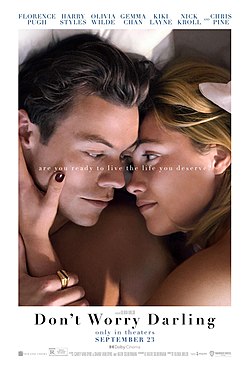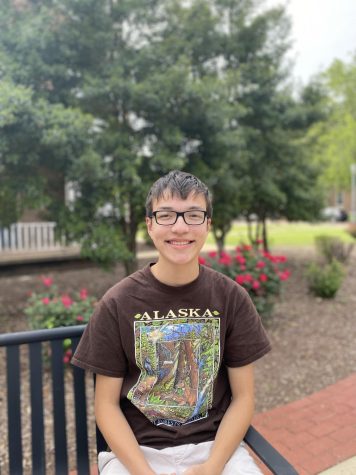Ross: ‘Don’t Worry Darling’ doesn’t deliver

New Line Cinema and Vertigo Entertainment
Olivia Wilde’s latest addition to the psychological thriller scene doesn’t have the anticipated delivery fans hoped for.
February 5, 2023
If you have been keeping up with recent pop culture news, you might have seen headlines regarding the film “Don’t Worry Darling,” starring Oscar-nominee Florence Pugh and Grammy-winner Harry Styles. While I won’t speak much on the drama, the weeks before the release have been a public relations nightmare for the film. Rumored beef between the director, Olivia Wilde and Pugh have become a hot topic on social media. Awkward moments that occurred during the premiere at the Venice Film Festival also went viral and fueled flames to an already blazing fire. With all that being said, how was the actual final product?
Being a fan of both Wilde’s last film, “Booksmart,” and Pugh’s work ever since “Midsommar,” “Don’t Worry Darling” was shaping up to become one of my most anticipated films of the year. To my disappointment, the film did not meet my — or most people’s — expectations.
While there is clear ambition on-screen during “Don’t Worry Darling,” the script fails to deliver a coherent story, leaving viewers with more questions than answers. The first third of the film makes viewers invested, but that quickly diminishes as the second act becomes repetitive at times. The third act brings the pace back up with more thematic sequences but did feel a little rushed and abrupt at the end.
What held the film together was Pugh as the film’s protagonist. We stay with her character, Alice, for the duration of the film; her performance is the main reason why the film doesn’t completely crash and burn. Styles, who does not do a terrible job by any means, does not contribute much to the film with a lackluster performance and continues to raise the point that not every singer needs to become an established actor.
One redeeming quality of the film is the atmospheric score composed by John Powell. The chilling and hypnotic chant-like breathing is littered throughout the music and sets an unnerving tone. To Wilde’s credit, the film is visually beautiful. The polished camera placement mixed with the glossy 1950s suburban utopia setting gives the film gravitas and stylish traits.
While this film had so much potential, “Don’t Worry Darling” falls short of something that could’ve been great. Even with Pugh’s acting ability and Wilde’s direction, the script clearly needed more revisions in the writers’ room. Though the film feels half-baked at times, it still accomplishes its goal of being an enjoyable mystery that will entertain you, even if you can sense the twists and themes from a mile away.








